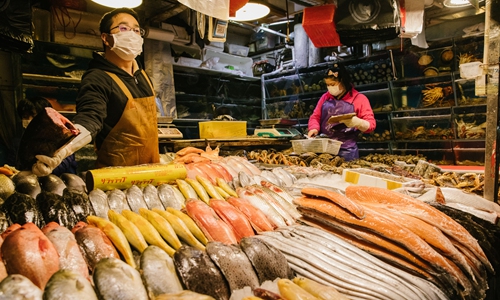GT Exclusive: Chinese, foreigners deem Beijing’s market zones highly sanitary
By Wang Qi in Beijing Source:Global Times Published: 2020/4/14 1:13:41

A seafood vendor solicits customers in Beijing's Sanyuanli Market in February. Photo: Li Hao/GT
A Global Times reporter visited four wet markets in Beijing, including the Sanyuanli market in Chaoyang district, which is one of the most renowned wet markets in the city. No animals from the wildlife trade, live poultry trade or animals slaughtered on site were found.
With 140 shops imbued and a rich variety of products found, Sanyuanli market attracts Chinese customers and foreigners alike.
The head of the market who requested anonymity told the Global Times on Saturday that the Beijing municipal government banned live poultry trading as early as in 2013.
Also currently no wet markets in Beijing within the Fifth Ring Road are allowed to sell live poultry, let alone trading wildlife.
The manager also noted that there are regional differences in demand for wildlife and live poultry. "People in northern China seldomely consume wildlife products, it is impossible to find wildlife markets outside of Beijing's Fifth Ring Road.
There may be some instances of illegal black market sales but that has no relationship with wet markets that are under strict supervision and management."
According to the manager, the Sanyuanli wet market is conducting daily checks on all meat and egg vendors' certificates for stocking permission and food safety, to ensure the food they sell is through legal channels like state-run meat processing factories.
Besides, the GT reporter found that all four markets have clear divisions inside. For instance, when you enter Sanyuanli market from its northern entrance, there are specially designated zones for fruits, poultry, aquaculture, seasoning and vegetables.
There is a wide variety of seafood, vegetables, fruits, and various meats including pork, beef, lamb, duck, chicken and pigeon.
Each stall has a business license hung overhead and a public display of products, marking the products' place of origin, slaughterhouse, and safety inspection department.
The manager said they had refurbished the market in 2012 in line with China's industry and commerce regulations, aiming to create a sanitary environment.
To improve sanitary conditions, Sanyuanli market also strictly conducts disinfection. According to the manager, the market is disinfected three times a day.
The market shall be responsible for disinfection of public areas, and the merchants shall be responsible for the disinfection of their own stalls.
Their actions will be recorded on paper and supervised through surveillance cameras.
In addition, garbage services are managed by five staff members and cleaned three times a day.
Regarding certain commentary from foreign media which had asked that China should close all of its wet markets due to the coronavirus pandemic, the manager said in response that their demands are unrealistic and show lack of understanding of China.
An employee from a Beijing-based embassy who often shops in the market told the Global Times that he has visited the wet market every Saturday for the past three years, as the food is "less expensive and fresher."
He believes that these wet markets are safe, especially during the epidemic when it is under much stricter supervision.
He also noted that wet markets in China are clean, don't sell any live animals, and it would be unwise to close down this type of market as many peoples' livelihoods depend on it.
In another wet market in Chaoyang district, a shop owner with eight years of experience selling seafood told the Global Times that he has never seen anyone selling wildlife in the market.
He said that he has witnessed the wet market becoming more standardized in recent years.
He used to set up his stall in random places, but now he has all of the legal certificates and has moved to a cleaner site.
He hopes that more Chinese markets will develop into iconic markets like Bashi market in South China's Xiamen or Tsukiji market in Tokyo, Japan.
"Calling for a shutdown on all wet markets in China is an overreaction because the vast majority of markets are qualified and safe. Markets don't face only supervision from regulators, but also eyes from residents nearby," a Chinese customer said.
Posted in: SOCIETY